The International Olympic Committee’s (IOC) decision on July 31 to award Beijing the 2022 Winter Olympics has sparked international concern in the face of China’s record of human rights abuse, and fears that their decision only weakens the spirit and principle of Olympism. There are particular concerns for Tibet following the unrest and crackdowns there around the time of the Beijing Olympics in 2008.
The run up to the decision on where to award the 2022 Winter Olympics has been the subject of international speculation and campaigns concerning the human rights implications of the decision. There had been calls for the IOC to consider voting “none of the above”, saying that calling off the 2022 bidding process would make a strong statement about the new Olympic Agenda agreed last December.
Neither of the two contenders, Beijing and Almaty in Kazakhstan, has a clean human rights’ track record, but Beijing won the 2008 Summer Olympics bid with promises of press freedom and honouring international human rights commitments, none of which were kept. Human Rights campaigners claimed that if the Olympics were to go to Beijing, this will be seen to endorse China’s unkept promises and human rights violations in the name of sport, and that there is a danger that awarding China the bid would embolden their behaviour.
Beijing has not relied on human rights “assurances” to bolster its bid this time around. The focus of its pitch was its past successful Olympic Games and obvious availing infrastructure. Prominent human rights activists, including the Tibetan monk, Golog Jigme whose film Leaving Fear Behind highlighted the dissatisfaction of repressed Tibetans at the 2008 Olympics, called for the IOC to take into consideration Beijing’s sheer disregard for upholding its role as a representative of the Olympic Charter. The Charter calls for the promotion of “a peaceful society concerned with the preservation of human dignity”. Chinese minority activists as well as human rights organisations around the world campaigned to influence the IOC’s decision through petitions and open letters.
Last December, the IOC agreed on the Olympic Agenda 2020 that set recommendations aimed at protecting human rights. Oslo’s withdrawal of its bid late last year prompted Human Rights Watch to call for them to hold the winning city to task under this new agenda.





 Print
Print Email
Email